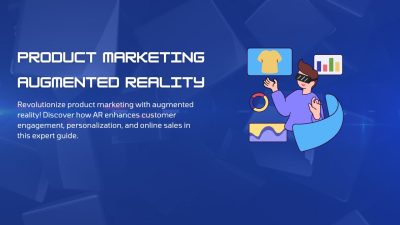Augmented reality marketing has evolved from a futuristic concept to a mainstream tool that brands use to connect with customers. But beyond creating memorable experiences, AR campaigns can significantly influence how consumers perceive your brand online. This technology doesn’t just showcase products—it shapes the conversations people have about your company across digital platforms.
What Makes AR Marketing Different for Brand Reputation

Traditional marketing methods rely on passive consumption. Customers view an ad, read content, or watch a video. AR marketing flips this dynamic by creating interactive experiences that encourage active participation. When customers engage with AR features, they often share these experiences on social media, creating user-generated content that directly affects your online reputation.
The immersive nature of AR means that customer reactions tend to be more intense, both positive and negative. A well-executed AR campaign can generate enthusiastic reviews and social shares. However, technical glitches or poorly designed experiences can lead to frustrated customers who voice their disappointment online.
AR marketing also creates transparency in ways other marketing methods don’t. When customers can virtually try products before purchasing, their expectations become more aligned with reality. This can reduce negative reviews related to unmet expectations, but it also means your products need to truly deliver on their promises.
Positive Impacts of AR on Your Online Reputation

Enhanced Customer Engagement Drives Positive Sentiment
AR experiences create memorable moments that customers want to share. When people post about trying virtual makeup filters, visualizing furniture in their homes, or playing branded AR games, they’re creating positive associations with your brand. These organic social media posts serve as authentic endorsements that boost your online reputation.
The novelty factor of AR often generates excitement. Early adopters appreciate brands that embrace innovative technology, and this enthusiasm translates into positive online reviews and social media mentions. Customers frequently praise companies for being “forward-thinking” or “cutting-edge” when they implement AR effectively.
Improved Product Understanding Reduces Return Rates
AR marketing allows customers to interact with products virtually before making purchases. This deeper understanding leads to more informed buying decisions and, consequently, fewer disappointed customers. When return rates decrease and customer satisfaction improves, your online reviews naturally become more positive.
Virtual try-on features for clothing, accessories, or cosmetics help customers make better choices about sizing, color, and style. Home decor and furniture brands benefit from AR placement tools that show how products look in customers’ actual spaces. These features reduce the gap between customer expectations and reality.
Increased Brand Differentiation Creates Positive Buzz
Companies using AR marketing often stand out from competitors who still rely on traditional approaches. This differentiation creates positive buzz online as customers and industry observers recognize your brand’s innovative approach. Tech-savvy consumers particularly appreciate brands that embrace new technologies.
Media outlets frequently cover successful AR campaigns, generating earned media that enhances your online presence. These articles and features contribute to a positive digital footprint that improves your overall online reputation.
AR Marketing and Customer Trust Building

Augmented reality marketing plays a powerful role in building customer trust by reducing uncertainty in the buying process. When customers can virtually experience products before purchasing, they feel more confident in their decisions. This transparency minimizes surprises after delivery and reinforces the perception that a brand is honest and customer-focused. Trust built through AR experiences often translates into positive reviews, repeat purchases, and long-term loyalty. Brands that consistently deliver accurate and reliable AR interactions strengthen their credibility online, making customers more likely to recommend them and defend the brand in public digital conversations.
The Role of User-Generated Content in AR Reputation Growth
AR marketing naturally encourages user-generated content, which has a strong influence on online reputation. When users share screenshots, videos, or reactions from AR experiences, they create authentic brand narratives that feel more trustworthy than traditional ads. This organic content amplifies brand visibility while reinforcing positive sentiment across social platforms. User-generated AR content also serves as social proof, validating the brand’s innovation and customer-centric approach. Over time, these shared experiences help shape a favorable digital identity and contribute to a stronger, more resilient online reputation.
Long-Term Brand Perception Shaped by AR Experiences
AR marketing impacts not only short-term engagement but also long-term brand perception. Consistently high-quality AR experiences position a brand as innovative, reliable, and future-ready. Customers begin associating the brand with convenience, transparency, and technological leadership. Conversely, inconsistent or poorly maintained AR features can weaken trust over time. Brands that treat AR as an evolving customer experience—regularly updating features and responding to feedback—create lasting positive impressions. This sustained approach ensures AR contributes to reputation growth rather than being viewed as a temporary or gimmicky marketing tactic.
Addressing Potential Negative Impacts of AR
Technical Issues Can Create Frustration
AR technology requires significant processing power and stable internet connections. When AR features don’t work properly, customers become frustrated and may express this disappointment online. Poor loading times, glitchy visuals, or compatibility issues can generate negative reviews and social media complaints.
To minimize these risks, thoroughly test your AR experiences across different devices and connection speeds. Provide clear technical requirements and alternative options for users whose devices can’t support the AR features.
Privacy Concerns May Generate Criticism
AR applications often require access to device cameras and location data. Some customers worry about privacy and data security when using these features. If your brand doesn’t clearly communicate how this data is used and protected, you may face criticism online about privacy practices.
Be transparent about data collection and use. Provide clear privacy policies and make it easy for customers to understand what information you’re collecting and why.
Overhyped Experiences Can Disappoint
When AR marketing promises more than it delivers, customer expectations become unrealistic. If the actual AR experience feels basic or gimmicky compared to your promotional materials, customers may feel deceived and express this disappointment in online reviews.
Set realistic expectations in your marketing materials. Focus on the genuine value your AR experience provides rather than overstating its capabilities.
Measuring AR’s Impact on Your Online Reputation
Monitor Social Media Mentions and Engagement
Track mentions of your brand in connection with your AR campaigns across social platforms. Look for both direct mentions and hashtags related to your AR experiences. Pay attention to the sentiment of these mentions and identify patterns in customer feedback.
Use social listening tools to monitor conversations about your AR marketing efforts. This helps you quickly identify any emerging issues and respond appropriately to maintain your reputation.
Analyze Review Content and Sentiment
Examine customer reviews to see how AR features influence overall satisfaction. Look for specific mentions of AR experiences in product reviews and customer feedback. Track whether the implementation of AR features correlates with changes in review ratings and sentiment.
Compare review sentiment before and after launching AR features to measure their impact on customer satisfaction and online reputation.
Track Customer Support Inquiries
Monitor customer support tickets and inquiries related to AR features. High volumes of technical support requests might indicate user experience issues that could lead to negative online feedback if not addressed promptly.
Use this data to identify common problems and improve your AR experiences before issues affect your online reputation.
Successful AR Marketing Campaigns and Reputation Impact
Beauty Brands Leading the Way
Major cosmetics companies have successfully used AR try-on filters to enhance their online reputation. These virtual makeup experiences have generated millions of social media shares and positive customer reviews. Customers appreciate the convenience and fun of trying products virtually, leading to increased brand loyalty and positive online sentiment.
Home Improvement and Furniture Success Stories
Furniture retailers using AR placement tools have seen significant improvements in customer satisfaction scores. By allowing customers to visualize products in their homes before purchasing, these brands have reduced return rates and negative reviews while increasing positive social media engagement.
Fashion Industry Innovation
Clothing brands implementing virtual fitting rooms have created positive buzz around their innovative approach to online shopping. These AR experiences have generated media coverage and customer enthusiasm, contributing to improved online reputation and brand perception.
Tips for Implementing AR Marketing Effectively
Start with Clear Objectives
Define what you want to achieve with your AR marketing campaign. Whether your goal is increasing engagement, reducing returns, or generating social media buzz, having clear objectives helps you design experiences that support your reputation goals.
Focus on User Experience
Prioritize smooth, intuitive AR experiences over flashy features. Customers value functionality and ease of use more than complex visual effects that don’t add real value. A simple, well-executed AR feature will generate more positive feedback than a complicated experience that frustrates users.
Provide Value Beyond Entertainment
While entertainment value matters, ensure your AR experience provides genuine utility to customers. Help them solve problems, make better purchasing decisions, or save time. Valuable AR experiences generate more positive reviews and recommendations.
Test Extensively Before Launch
Conduct thorough testing across different devices, operating systems, and network conditions. Identify and fix technical issues before customers encounter them. This prevents negative feedback that could damage your online reputation.
Create Shareable Moments
Design AR experiences that naturally encourage social sharing. Include features that make it easy for customers to capture and share their AR interactions. User-generated content from AR experiences serves as authentic marketing that enhances your online reputation.
The Future of AR and Online Reputation Management
AR technology continues advancing rapidly, creating new opportunities for brands to enhance their online reputation. As AR becomes more accessible and sophisticated, customer expectations will also evolve. Brands that embrace this technology thoughtfully and prioritize customer experience will build stronger online reputations.
The integration of AR with other technologies like artificial intelligence and machine learning will create even more personalized experiences. These developments will likely increase the impact of AR marketing on online reputation, making it even more important for brands to implement these tools strategically.
Success with augmented reality marketing requires balancing innovation with reliability. Focus on creating valuable, user-friendly experiences that genuinely benefit your customers. When you prioritize customer satisfaction over flashy technology, your AR marketing efforts will contribute positively to your online reputation and drive long-term business growth.
Frequently Asked Questions (FAQ) – AR Marketing and Online Reputation
1. What is augmented reality (AR) marketing?
Augmented reality marketing uses digital overlays such as 3D visuals, animations, or interactive elements placed in real-world environments through smartphones or AR-enabled devices. It allows customers to virtually try, view, or interact with products, creating immersive brand experiences.
2. How does AR marketing impact online brand reputation?
AR marketing influences online reputation by increasing customer engagement, encouraging social sharing, and improving product understanding. Positive AR experiences often lead to favorable reviews and user-generated content, while poor execution can result in negative feedback.
3. Can AR marketing reduce negative customer reviews?
Yes. AR helps customers set realistic expectations by allowing virtual product trials. When customers better understand a product before purchasing, dissatisfaction and return-related complaints are reduced, leading to more positive reviews.
4. What industries benefit most from AR marketing?
Beauty, fashion, furniture, home décor, real estate, and automotive industries benefit greatly from AR marketing. These sectors rely heavily on visualization, making AR ideal for virtual try-ons and product placement experiences.
5. What risks can AR marketing pose to online reputation?
Technical glitches, slow performance, privacy concerns, and overpromising features can frustrate users. If these issues are not managed properly, they may lead to negative reviews, social media criticism, and trust issues.
6. How can brands prevent negative feedback from AR campaigns?
Brands should thoroughly test AR features across devices, clearly communicate technical requirements, be transparent about data usage, and avoid exaggerating AR capabilities in promotions.
7. How can businesses measure AR marketing’s reputation impact?
Businesses can track social media sentiment, review ratings, customer feedback, engagement metrics, and support inquiries before and after launching AR campaigns to assess reputation changes.
8. Does AR marketing improve customer trust?
When implemented transparently and effectively, AR builds trust by providing accurate product previews and honest experiences. This transparency helps customers feel confident in their purchasing decisions.
9. Is AR marketing suitable for small businesses?
Yes. Many AR tools are now affordable and scalable. Small businesses can use simple AR filters or product previews to enhance customer experience without large investments.
10. What is the future of AR marketing in reputation management?
As AR technology becomes more advanced and accessible, it will play a larger role in shaping brand perception. Brands that focus on usability, value, and customer satisfaction will gain long-term reputation benefits.





